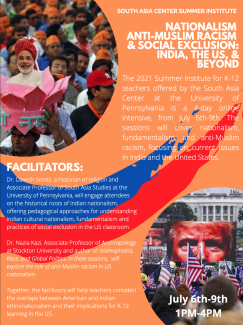Event

The 2021 summer institute for K-12 teachers offered by the South Asia Center at the University of Pennsylvania is a 4-day online intensive, to be held July 6th-9th. The sessions will cover nationalism, fundamentalism, and anti-Muslim racism, focusing on current issues in India and the United States. Davesh Soneji, a historian of religion and Associate Professor of South Asia Studies at the University of Pennsylvania, will engage attendees on the historical roots of Indian nationalism, offering pedagogical approaches for understanding Indian cultural nationalism, fundamentalism, practices of social exclusion in the US classroom. Nazia Kazi, Associate Professor of Anthropology at Stockton University and author of Islamophobia, Race, and Global Politics, will consider the legacy of the War on Terror which followed 9/11, a “forever war” that shows no sign of ending. In these sessions, she will explore the role of anti-Muslim racism in the US nationalism and consider how classroom lessons on 9/11 often reinforce the Islamophobic assumptions of the War on Terror. The institute will close with a joint session by both Soneji and Kazi, considering the overlaps between American and Indian ethnonationalism and their implications for K-12 learning in the US. Teachers who attend will be eligible for 12 ACT 48 credits. Admissions is limited. All attendees must apply to join.
DEADLINE TO APPLY IS MAY 31, 2021.
PROGRAM SCHEDULE:
July 6th, 2021
Part 1
1-2:30 p.m.
Colonial Modernity, “Reform,” and Religious Nationalism in India
Davesh Soneji opens with a discussion of the roots of nationalism in the project of British colonialism in South Asia. He demonstrates how Hindu nationalism as it exists today is the outgrowth of the complex intersections of earlier forms of anti-colonial nationalism and Hindu religious “reform” movements that attempted to counter imperial and missionary representations of Hinduism. He examines how forms of religious nationalism were central to the formation of the post-colonial Indian state and permeated everyday cultural practices that came to be understood as “national Indian heritage.”
Part 2
2:30-4 p.m.
Empire, Ethnonationalism, and Systemic Islamophobia
Nazia Kazi offers an introduction to the concept of Islamophobia, both pre- and post-9/11. This session will think carefully about the post-9/11 era, in which state powers of surveillance, policing, and deportation expanded. Rather than understanding Islamophobia as a form of religious bigotry or intolerance, attendees will consider the material bases of Islamophobia. It is, in other words, a natural by-product of US empire, a form of systemic racism rooted in state practices. This session will consider the relationship between American racism (that which happens domestically) and the actions of the US on the world stage.
July 7th, 2021
1-4 p.m.
Race, Caste, and the Politics of Social Exclusion in South Asia and its Diaspora
Using examples drawn from both Indian and transnational Hindu contexts, the first half of this session examines the reification and amplification of forms of social exclusion (such as race, caste, and Islamophobia) through the global work of Hindu nationalism in the twenty-first century. It examines how the Indian political and cultural landscape was transformed in India after 1980 when the Hindu nationalist political party known as the Bharatiya Janata Party (BJP) was formed, and the global effects of the “normalization” of right-wing nationalism as everyday politics among Indians living in India and abroad. The session also considers the ways in which majoritarian politics have shaped communal and caste-based violence, forms of discrimination, and the idea of India as a “Hindu nation” not only in India, but also in global contexts. The second half of the session focuses on the possibilities for critical pedagogical interventions related to teaching questions of race, the South Asian components of “world history,” and nationalism in the US classroom.
July 8th, 2021
1-4p.m.
Two Decades of the War on Terror: “Never Forget” in the US Classroom
In the first half of this session, Kazi considers the role of 9/11 in American classrooms and discusses the 2 decades of the War on Terror. Specifically, this session considers how many Americans (especially young learners) misunderstand the events of 9/11 and the War on Terror that followed. Textbooks and national monuments memorialize the events of 9/11 in ways that erase crucial context and often reinforce a performative nationalism. This session will consider the costs of the War on Terror (in human lives, environmental impact, and global refugee crises). It will further examine how the “security state” (in other words, the focus on terrorism prevention and homeland security) has pervaded American classrooms. Attendees will reflect upon the repressive classroom climate that emerged after 9/11, in which students and teachers alike were criminalized for critiquing the US war on terror, and ask how this legacy affects the US classroom today.
The second half of this session will be a curriculum development workshop. Attendees will build a list of the sources (films, books, and online material) that are useful for a variety of classroom settings and design pedagogical activities that foster a critical consciousness different from the traditional “terrorism studies” approach taken in many US classrooms.
July 9th, 2021
1-4p.m.
Concluding Session
This session, co-facilitated by Kazi and Soneji, will reflect upon the major themes of the preceding sessions. The first half of the session will look at the overlaps – especially the central role of Islamophobia – between the Indian and US contexts. The implications for settings beyond these two countries will further be discussed, as well as a consideration of the alliance between the US and Indian government. The second half of the session will be an interactive conversation, asking attendees to explore the major takeaways and pedagogical imperatives of the program.
